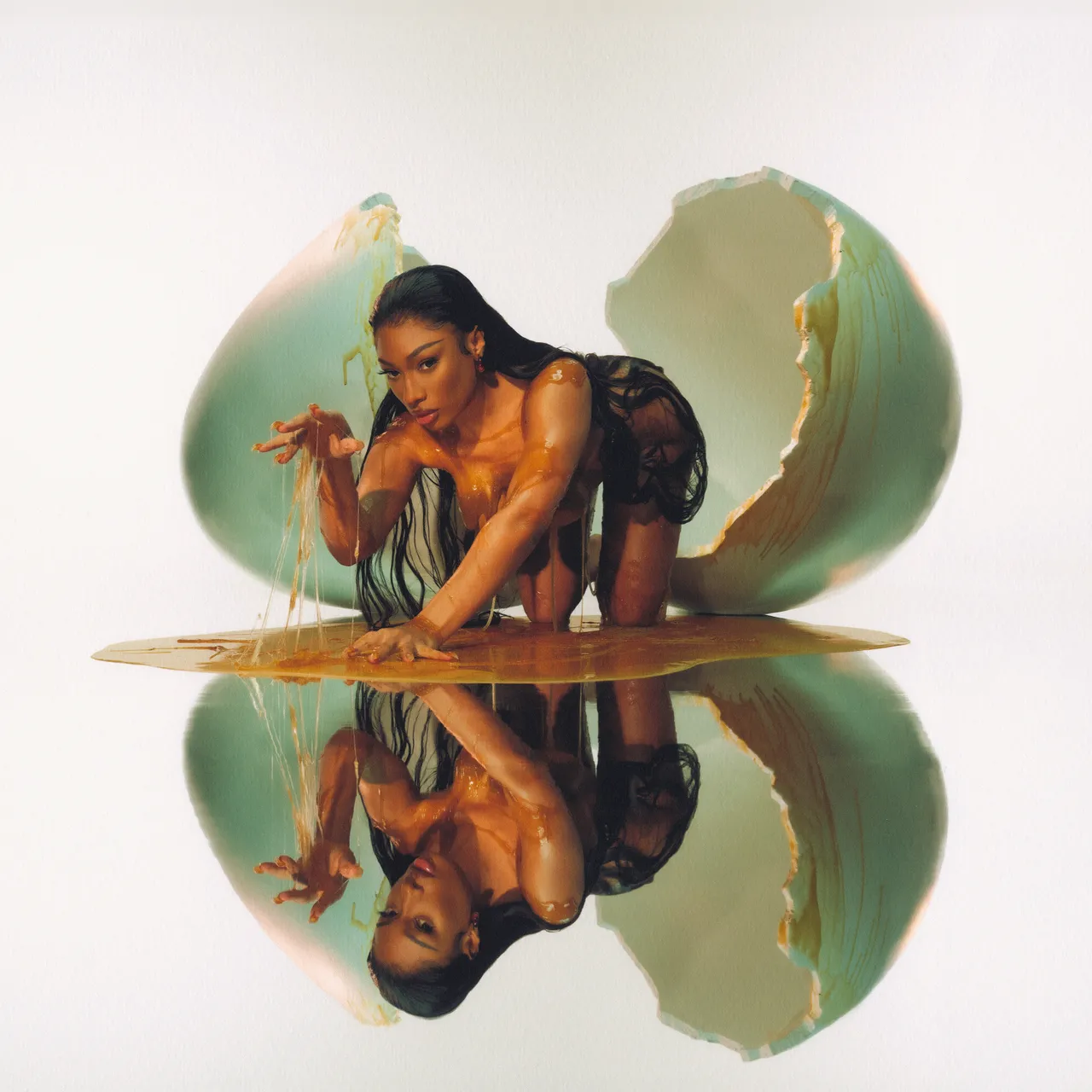Music
Megan Thee Stallion
MEGAN
Hot Girl Productions
Street: 06.28
Megan Thee Stallion = Mariah Carey attitude + Doja Cat flow + cupcaKke vulgarity
A decade after Tumblr gave us the “sad girl” archetype, Megan Thee Stallion is catapulting her raunchy repertoire to the next level by serving an alternative response to oppression under heteropatriarchy on MEGAN. Rather than embodying the familiar hyperbole of a tragic heroine, her self-referential third album is boisterously self-confident. Five years after the 2019 single “Hot Girl Summer” featuring Ty Dolla $ign and Nicki Minaj—funny in hindsight, given Minaj’s diss track “Big Foot” in January of 2024 and the unhinged social media responses to MEGAN’s lead single, “HISS”—on the first album released under her independent label, Megan schools us for a 52-minute lecture on what it means to be a “hot girl.”
Hot girl summer isn’t just a season. It’s grown beyond Megan Thee Stallion’s brand, the confrontational and raw energy embodied by her moniker “Tina Snow” and her club anthems’ sexually explicit lyrics. On MEGAN, hot girl shit becomes a mindset, lifestyle and a code of conduct. Megan patterns how a hot girl should facetiously and aggressively respond to abuse at the hands of men, as well as the male-dominant culture that emboldens their worst acts and quickly pardons their crimes, all while blaming women.
Kicking the album off with a diss track filled with nearly countless pop-culture histories, one of Megan’s best references is to Mariah Carey’s “Obsessed,” aligning her dissenting crowd with the same delusional frenzy of 2000s Eminem, while elevating herself to the same status as the perpetual diva and Aries queen. After being shot by rapper Tory Lanez, the legitimacy and severity of Megan’s victimhood were called into question by several of her contemporaries. But using her latest album as a feminist response to violence and misogynoir, Megan’s artistry is driving the culture of the 2020’s to a far more intersectional and impactful discourse than the girlboss icons who dominated the 2010’s—like Taylor Swift, who’s still playing the victim this year on tracks like “Who’s Afraid of Little Old Me?” even after reaching billionaire status.
Megan laughingly condemns misogyny from a position of unbothered defiance rather than victimhood. Throughout the entire album, Megan calls out hypocrisy with the laser precision only a Grammy-winning, Black and bisexual woman can deliver. On “Rattle,” she highlights how pathetic men can be, observing a startling truth: “Cause the n***** don’t beef with the n***** / They scared of each other but beat on the women.”
Calling out tired over-sexualization and victim-blaming tropes that dominate patriarchal conversations dictating how one should navigate unwanted sexual advances from men, Megan instead steers the focus toward men’s pitiful inability to control their basic impulses, while relishing in female pleasure and sexuality. Alongside the latest Best New Artist Grammy winner Victoria Monet, Megan scoffingly says: “All I did was look at the n**** and he said ‘why you teasing?’ / Damn.” Like, isn’t he pathetic for thinking I wanted him when I literally only looked at him??
On the same track, “Spin,” Monet asks: “Is it real or fake? So? Bet you still gon’ hit it though.” Mocking those who criticize BBL’s (Brazilian butt lift) and other cosmetic enhancements, the duo ironically pokes fun at those critics who are also the first in line for a chance at scoring some “big cake,” whether it’s real or plastic. Megan plays on this theme most iconically in her opening track, with bars speculated to reference Drake: “These n***** hate on BBL’s / And be walking around with the same scars.”
One of the most impactful triumphs of MEGAN is how the album packages cultural criticism into an accessible anthology of club bangers that enters virtual spaces primarily occupied by the alt-right and teenage boys. Using anime references and video game-inspired aesthetics and fashion in the “BOA” music video (comprehensively identified by IGN), it’s interesting to see how online communities have expanded and diversified in recent years to include geeks beyond 4chan users—and all the associated negative stereotypes and ideologies there.
A dynamo of authenticity, Megan doesn’t shy away from the severity of her darkest moments. On the final track “Cobra,” she wonders, “How can somebody so blessed wanna slit they wrist?” But amidst brutal challenges, Megan consistently reminds us what may be rule one of being a hot girl: loving yourself above any man—even when you (and your pussy) are depressed. Self-empowerment can be nurtured by relishing in the often-taboo feminine carnal.
Daringly, her lyrics aren’t graphic solely in their depiction of intercourse from a woman’s perspective, but also in the meaningful practice of engaging in thorough self-pleasure: “Two fingers give me peace, switch hands finna cheat / Then I sleep in my own wet spot in the sheets,” she declares unabashedly. While it’s still too early to predict the full impact of this agenda-setting album, at the very least, MEGAN challenges us to finally ditch the sad girl archetype by presenting us with another alternative that’s empowering rather than enabling. –Arthur Diaz
Read more national album reviews:
Review: feeble little horse – Girl with Fish
Review: Justice – Hyperdrama

